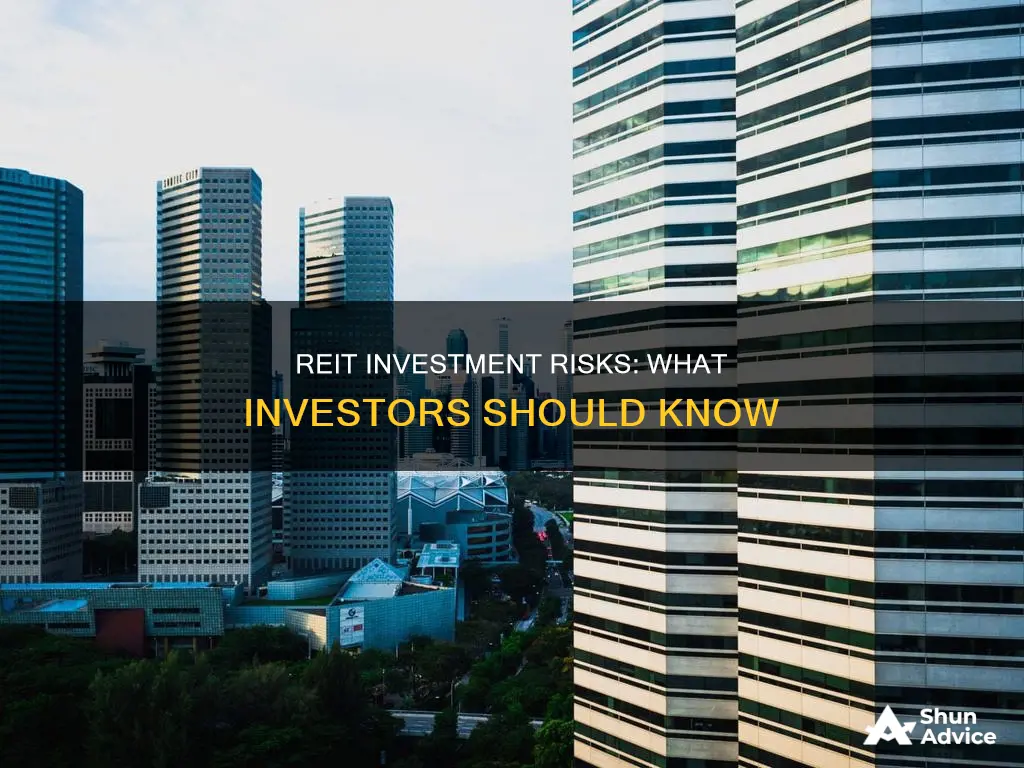
There are a number of risks associated with investing in REITs (real estate investment trusts). REITs are traded on public exchanges, and are therefore subject to market risk. Causes of market risk include changes in interest rates, inflation and recessions. REITs are also less liquid compared to other investments, such as bonds and stocks. There is also the risk that the property values of the REITs will decline, or that an event will occur that decreases the demand for the type of property the REIT holds.
| Characteristics | Values |
|---|---|
| Declining property values | Real estate does not always go up in value |
| Choosing the wrong REIT | Potential investors may not gain notable returns |
| Liquidity | REITs are less liquid than other investments |
| Dividend distributions | No guarantee investors will receive their dividend distributions |
| Expenses and commissions | Significant costs can eat into the value of an investor's stake |
| Property-specific risks | An event may occur that decreases the demand for a certain type of property |
| Market risk | REITs are highly sensitive to fluctuations in interest rates |
What You'll Learn

Declining property values
There are several risks associated with investing in REITs. One of the main risks is declining property values. Real estate does not always increase in value and there is a chance that investors may choose the wrong REIT and not gain any notable returns. For example, office REITs have suffered during the COVID-19 pandemic as long-term work-from-home policies have reduced the need for office space. Some tenants have even stopped paying their rent, asked for rent relief, or gone out of business.
REITs are also subject to market risk, including changes in interest rates, inflation and recessions. They are usually highly sensitive to fluctuations in interest rates. High interest rates can be detrimental to REITs in multiple ways.
Another risk is that there is no guarantee that investors in non-traded REITs will receive their dividend distributions. If they do receive them, they may be derived from sources other than the cash flow from business operations, such as borrowings, the sale of assets or other investors' money. These sources can decrease an investor's interest. Non-traded REITs are also subject to significant expenses and commissions that eat into the value of an investor's stake. For example, REITs charge an upfront fee of 8-10% or sometimes as high as 15%. There are also external REIT manager's fees to consider.
Public REITs allow investors to sell their shares on the public exchange market, but the investments are less liquid compared to other investments, such as bonds and stocks. There is no secondary market for finding buyers and sellers for the property, and liquidity is only provided through the fund's repurchase offers. There is also no guarantee that shareholders will be able to sell all or part of the shares they desire to sell in the quarterly repurchase offers.
Hiring an Investment Manager: Key Considerations for Success
You may want to see also

Liquidity
Firstly, REITs are generally less liquid than other types of investments, such as bonds and stocks. This is because there is no secondary market for finding buyers and sellers for the underlying property assets. Liquidity is primarily provided through the fund's repurchase offers, which may not always be available or sufficient to meet investor demand. Additionally, there is no guarantee that shareholders will be able to sell all or part of their shares in these quarterly repurchase offers.
Another factor affecting liquidity is the potential for significant expenses and commissions associated with non-traded REITs. These costs, such as upfront fees and external REIT manager's fees, can eat into the value of an investor's stake, reducing the overall liquidity of the investment.
Property-specific risks can also impact the liquidity of REITs. For example, events that decrease the demand for a particular type of property, such as the COVID-19 pandemic's impact on office REITs, can result in financial distress and reduced liquidity.
Finally, market risks, including changes in interest rates, inflation, and recessions, can affect the liquidity of REITs. High interest rates, in particular, can have a detrimental effect on REITs as they increase the cost of borrowing and may lead to a decrease in property values.
Savings, Investment, and Productivity: The Interplay for Economic Growth
You may want to see also

Property-specific risks
REITs, or Real Estate Investment Trusts, are traded on public exchanges and are therefore subject to market risk. This includes changes in interest rates, inflation and recessions.
However, there are also property-specific risks associated with REITs. Since many REITs may only hold one type of property, they are vulnerable to financial distress if an event occurs that decreases the demand for that property. For example, office REITs suffered during the COVID-19 pandemic as long-term work-from-home policies reduced the need for office space. Some tenants stopped paying rent, asked for rent relief, or went out of business.
Additionally, there is a risk that investors may choose the wrong REIT and not gain any notable returns. REITs are less liquid compared to other investments, such as bonds and stocks, and there is no secondary market for finding buyers and sellers for the property. Liquidity is only provided through the fund's repurchase offers, and there is no guarantee that shareholders will be able to sell all or part of their shares in these quarterly offers.
Furthermore, investing in non-traded REITs carries the risk that investors may not receive their dividend distributions. If distributions are received, they may be derived from sources other than the cash flow from business operations, such as borrowings, sales of assets, or other investors' money. These sources can decrease an investor's interest and eat into the value of their stake.
BlackRock's Investment Strategies: Exploring India's Potential
You may want to see also

Market risk
REITs are traded on public exchanges and are therefore subject to market risk. This includes changes in interest rates, inflation and recessions. REITs are usually highly sensitive to fluctuations in interest rates. High interest rates are bad for REITs in more than one way.
REITs are less liquid compared to other investments, such as bonds and stocks. There is no secondary market for finding buyers and sellers for the property, and liquidity is only provided through the fund’s repurchase offers. There is no guarantee that all shareholders leaving their investments will be able to sell all or part of the shares they desire to sell in the quarterly repurchase offers.
Non-traded REITs are also subject to significant expenses and commissions that eat into the value of an investor’s stake. For example, REITs charge an upfront fee of 8%-10% or sometimes as high as 15%. Another cost is the external REIT manager’s fees that are paid to a third-party professional manager for managing the REIT’s portfolio of assets.
Since many REITs may only hold one type of property, they may face serious financial distress if an event occurs that decreases the demand for such property. For example, office REITs have taken a considerable hit throughout the COVID-19 pandemic, as long-term work from home policies have diminished the need for office space and some tenants have stopped paying their rent, asked for rent relief, or have gone out of business.
Trade Deficit: Investment, Savings and the Economy
You may want to see also

Dividend distributions
There are several risks associated with investing in REITs, and these can impact dividend distributions.
REITs are traded on public exchanges and are therefore subject to market risk. Causes of market risk include changes in interest rates, inflation and recessions. REITs are usually highly sensitive to fluctuations in interest rates. High interest rates are bad for REITs in more than one way.
There is also the risk that the property values will decline. Real estate does not always go up in value. Potential REIT investors face the risk that they may choose the wrong REIT and not gain any notable returns. Property-specific risks are also associated with REITs. Since many REITs may only hold one type of property, they may face serious financial distress if an event occurs that decreases the demand for such property. For example, office REITs have taken a considerable hit throughout the COVID-19 pandemic, as long-term work from home policies have diminished the need for office space and some tenants have stopped paying their rent, asked for rent relief, or have gone out of business.
Another risk associated with investing in non-traded REITs is that there is no guarantee that investors will receive their dividend distributions. If they do receive distributions, they may be derived from sources other than the cash flow from business operations. These sources may include borrowings, the sale of offerings, the sale of assets, or even other investors' money. Such sources decrease an investor's interest. Non-traded REITs are also subject to significant expenses and commissions that eat into the value of an investor's stake. For example, REITs charge an upfront fee of 8%-10% or sometimes as high as 15%external REIT manager's fees that are paid to a third-party professional manager for managing the REIT's portfolio of assets.
Public REITs allow investors to sell their shares on the public exchange market, but the investments are less liquid compared to other investments, such as bonds and stocks. There is no secondary market for finding buyers and sellers for the property, and liquidity is only provided through the fund's repurchase offers. Also, there is no guarantee that all the shareholders leaving their investments will be able to sell all or part of the shares they desire to sell in the quarterly repurchase offers.
Understanding the Portfolio Investment Scheme: A Guide
You may want to see also
Frequently asked questions
REITs are traded on public exchanges and are therefore subject to market risk. They are also less liquid compared to other investments, such as bonds and stocks. There is also the risk that the property value will decline.
Causes of market risk include changes in interest rates, inflation and recessions. REITs are usually highly sensitive to fluctuations in interest rates.
There is no guarantee that investors will receive their dividend distributions, and if they do, it may be derived from sources other than the cash flow from business operations.
Many REITs may only hold one type of property, so they may face serious financial distress if an event occurs that decreases the demand for such property. For example, office REITs took a hit during the COVID-19 pandemic as long-term work from home policies diminished the need for office space.
There is a risk that investors may choose the wrong REIT and not gain any notable returns.







